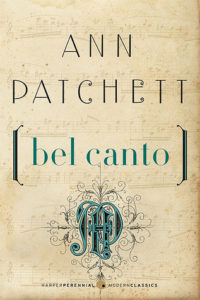 Fifteen international world-travelers attend a gala party in the presidential palace of a South American country to hear a famous American opera singer perform. The palace is stormed by armed terrorists who hold the party-goers hostage while they negotiate with the government over four months. During that time of confinement, relationships develop.
Fifteen international world-travelers attend a gala party in the presidential palace of a South American country to hear a famous American opera singer perform. The palace is stormed by armed terrorists who hold the party-goers hostage while they negotiate with the government over four months. During that time of confinement, relationships develop.
The characters and their relationships are cartoony, the way they are in opera, where plot is vehicle for the music. Operatic plots are often stereotypical stories of impossible love, palace intrigue, betrayal and unjust death. One of Patchett’s hostages learns to play chess rather well simply by watching a few games, so he can go on to play against one of the terrorist generals: convenient for the story but not the least bit believable. In many improbable, unmotivated turns of events we must allow operatic license.
Yet where is the music for the story? Supposedly, it is Patchett’s lyrical writing, and that analogy almost works. Some of her descriptions and some characters’ thoughts and observations are insightful and beautifully rendered. But not consistently over three hundred pages. This book is not prose poetry. The music goes quiet for hundreds of pages at a time and absolutely nothing happens. The micro-movements of the characters’ thoughts and feelings cannot be interesting if they are not motivated by anything. That is the definition of arbitrariness.
We get endless description of characters’ thoughts, hopes, anxieties, memories, desires, and idle speculations. These I found extremely boring but judging from reviews, some readers were enraptured by them, so that’s who should read this book: people who have little insight into human psychology so are fascinated by Patchett’s ersatz intimacy with their thoughts.
It might have worked if the characters were distinguishable on the inside but they were all the same: bland and banal. On the outside, they all spoke different languages so communication was difficult without the single translator, and the music. So there is a tiny paradox there between what keeps us apart despite being all the same.
On the plus side, I liked the way the narrator flitted from head to head, something we are never supposed to do as writers, but which she does successfully and without confusion. That’s an accomplishment no opera, indeed no theatrical performance, can do, so Patchett did exploit the unique capabilities of her medium with high skill.
Her descriptions of opera and the music were superficial, so despite the operatic theme of the book, you won’t learn anything except maybe the titles of some of the more famous arias in some of the more famous operas. As a fan of Italian opera myself, I know there are shelves of books describing the great operas with insightful detail, both the plots and the music. None of that is in Bel Canto (=“beautiful song,” an operatic term for a lyrical style of singing).
The appalling epilog, clearly tacked on as an afterthought, was probably demanded by the publisher, a tribute to the tyranny of book marketing.
I enjoyed this book a lot more when I read it fifteen years ago when I had not yet started writing fiction and was swimming in Puccini and Verde. I wish I had written a review of it then. That me is gone now.
Rumor has it that a movie is in the works with Rene Fleming as the opera star. I’ll see it, but if the movie hews closely to the book, there won’t be much singing in it. It will most likely be a sentimental costume drama. A lot of people like those.
Patchett, Ann (2001) Bel Canto. New York: Harper Perennial. (318 pp.)
